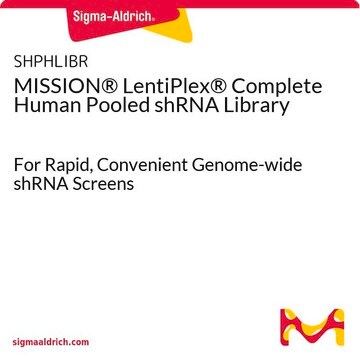ORFBFPH
MISSION® TRC3 ORF BFP Lentivirus High Titer Control
Anmeldenzur Ansicht organisationsspezifischer und vertraglich vereinbarter Preise
Alle Fotos(1)
About This Item
UNSPSC-Code:
41106609
NACRES:
NA.51
Empfohlene Produkte
Verpackung
vial of 200 μL
Qualitätsniveau
Konzentration
5x108 VP/ml (via p24 assay)
Anwendung(en)
genome mapping
genomic analysis
Versandbedingung
dry ice
Lagertemp.
−70°C
Verwandte Kategorien
Allgemeine Beschreibung
The MISSION TRC3 ORF BFP Lentivirus High Titer Control Transduction Particles contain an ORF insert expressing BFP, and is useful as a positive (or negative control) in experiments using the MISSION TRC3 LentiORF Library Collection in arrayed or pooled format, including our latest Whole Genome LentiORF Pool.
The BFP ORF control transduction particles are produced from the sequence-verified lentiviral plasmid, pLX307-puro-BFP (ORFBFP). This positive control can be used for measuring transduction efficiency and optimizing ORF delivery in cell lines that do not survive any puromycin exposure. The BFP Control contains a gene encoding BFP driven by the EF1a promoter. This control provides fast visual confirmation of successful transduction. Ampicillin and puromycin antibiotic resistance genes provide selection in bacterial or mammalian cells respectively.
Unlike murine-based MMLV or MSCV retroviral systems, lentiviral-based particles permit efficient infection and integration of the construct into differentiated and non-dividing cells, such as neurons and dendritic cells, overcoming low transfection and integration difficulties when using these cell lines. Self-inactivating replication incompetent viral particles are produced in packaging cells (HEK293T) by co-transfection with compatible packaging plasmids.
In addition, the Control Transduction Particles are pseudotyped with an envelope G glycoprotein from Vesicular Stomatitis Virus (VSV-G), allowing transduction of a wide variety of mammalian cells. 200 μl of 5x108 TU/ml (via p24 titering assay) lentiviral particles are provided as frozen stock.
This high titer offering is recommended for customers: who need to utilize smaller volumes of virus, who have very difficult to transduce cell lines, or who need to transduce large numbers of cells.
When conducting experiments using MISSION TRC3 ORF clones, the proper controls should be a key element of your experimental design to allow for accurate interpretation of gene and protein expression results. The MISSION Control Transduction Particles are a critical positive control to monitor transduction efficiency.
To see application data, protocols, vector maps, and more visit the TRC3 Information Page
The BFP ORF control transduction particles are produced from the sequence-verified lentiviral plasmid, pLX307-puro-BFP (ORFBFP). This positive control can be used for measuring transduction efficiency and optimizing ORF delivery in cell lines that do not survive any puromycin exposure. The BFP Control contains a gene encoding BFP driven by the EF1a promoter. This control provides fast visual confirmation of successful transduction. Ampicillin and puromycin antibiotic resistance genes provide selection in bacterial or mammalian cells respectively.
Unlike murine-based MMLV or MSCV retroviral systems, lentiviral-based particles permit efficient infection and integration of the construct into differentiated and non-dividing cells, such as neurons and dendritic cells, overcoming low transfection and integration difficulties when using these cell lines. Self-inactivating replication incompetent viral particles are produced in packaging cells (HEK293T) by co-transfection with compatible packaging plasmids.
In addition, the Control Transduction Particles are pseudotyped with an envelope G glycoprotein from Vesicular Stomatitis Virus (VSV-G), allowing transduction of a wide variety of mammalian cells. 200 μl of 5x108 TU/ml (via p24 titering assay) lentiviral particles are provided as frozen stock.
This high titer offering is recommended for customers: who need to utilize smaller volumes of virus, who have very difficult to transduce cell lines, or who need to transduce large numbers of cells.
When conducting experiments using MISSION TRC3 ORF clones, the proper controls should be a key element of your experimental design to allow for accurate interpretation of gene and protein expression results. The MISSION Control Transduction Particles are a critical positive control to monitor transduction efficiency.
To see application data, protocols, vector maps, and more visit the TRC3 Information Page
Anwendung
Functional Genomics/Overexpression Screening/Target Validation
Angaben zur Herstellung
Puro Kill Curve and Determining CFU (Colony Formation Unit) per mL. Prior to performing a library-scale screening, two preliminary experiments must be conducted. Visit the Lentiviralpool Information Page or refer to the technical bulletin.
Rechtliche Hinweise
Use of this product is subject to one or more license agreements. For details, please see the MISSION License Page
MISSION is a registered trademark of Merck KGaA, Darmstadt, Germany
Ähnliches Produkt
Produkt-Nr.
Beschreibung
Preisangaben
Lagerklassenschlüssel
12 - Non Combustible Liquids
WGK
WGK 3
Flammpunkt (°F)
Not applicable
Flammpunkt (°C)
Not applicable
Analysenzertifikate (COA)
Suchen Sie nach Analysenzertifikate (COA), indem Sie die Lot-/Chargennummer des Produkts eingeben. Lot- und Chargennummern sind auf dem Produktetikett hinter den Wörtern ‘Lot’ oder ‘Batch’ (Lot oder Charge) zu finden.
Besitzen Sie dieses Produkt bereits?
In der Dokumentenbibliothek finden Sie die Dokumentation zu den Produkten, die Sie kürzlich erworben haben.
Unser Team von Wissenschaftlern verfügt über Erfahrung in allen Forschungsbereichen einschließlich Life Science, Materialwissenschaften, chemischer Synthese, Chromatographie, Analytik und vielen mehr..
Setzen Sie sich mit dem technischen Dienst in Verbindung.






